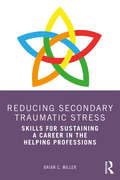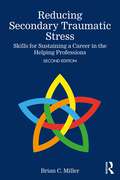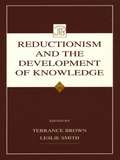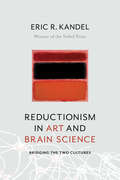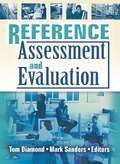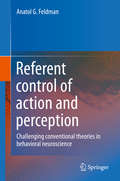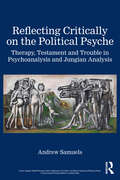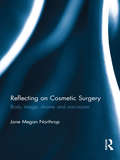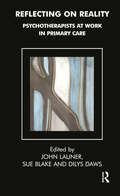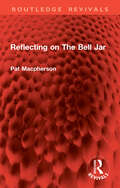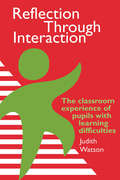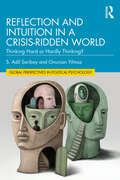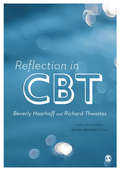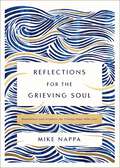- Table View
- List View
Reducing Secondary Traumatic Stress: Skills for Sustaining a Career in the Helping Professions
by Brian C. MillerReducing Secondary Traumatic Stress presents a model for supporting emotional well-being in workers who are exposed to the effects of secondary trauma. The book provides helping professionals with a portfolio of skills that supports emotion regulation and recovery from secondary trauma exposure and also that enhances the experience of the helping encounter. Each chapter presents evidence-informed skills that allow readers to regulate distressing emotions and to foster increased empathy for those suffering from trauma. Reducing Secondary Traumatic Stress goes beyond the usual discussion of burnout to talk in specific terms about what we do about the very real stress that is produced by this work.
Reducing Secondary Traumatic Stress: Skills for Sustaining a Career in the Helping Professions
by Brian C. MillerThe second edition of Reducing Secondary Traumatic Stress expands the five evidence-informed CE-CERT practices for supporting emotional well-being in workers exposed to the effects of secondary trauma. Adding new insights, additional research support, and fresh examples, the conversational tone makes this edition eminently readable and especially useful.Not only does the book provide helping professionals with a portfolio of skills that support emotion regulation and recovery from secondary trauma exposure, it also enhances the experience of the helping encounter. Each chapter presents evidence-informed skills that allow readers to regulate distressing emotions and foster increased empathy for those suffering from trauma. Reducing Secondary Traumatic Stress goes beyond the usual discussion of burnout to talk in specific terms about what we do about the very real stress that is produced by this work.
Reductionism and the Development of Knowledge (Jean Piaget Symposia Series)
by Leslie Smith Terrance BrownAmong the many conceits of modern thought is the idea that philosophy, tainted as it is by subjective evaluation, is a shaky guide for human affairs. People, it is argued, are better off if they base their conduct either on know-how with its pragmatic criterion of truth (i.e., possibility) or on science with its universal criterion of rational necessity. Since Helmholtz, there has been increasing concern in the life sciences about the role of reductionism in the construction of knowledge. Is psychophysics really possible? Are biological phenomena just the deducible results of chemical phenomena? And if life can be reduced to molecular mechanisms only, where do these miraculous molecules come from, and how do they work? On a psychological level, people wonder whether psychological phenomena result simply from genetically hardwired structures in the brain or whether, even if not genetically determined, they can be identified with the biochemical processes of that organ. In sociology, identical questions arise. If physical or chemical reduction is not practicable, should we think in terms of other forms of reduction, say, the reduction of psychological to sociological phenomena or in terms of what Piaget has called the "reduction of the lower to the higher" (e.g., teleology)? All in all, then, reductionism in both naive and sophisticated forms permeates all of human thought and may, at least in certain cases, be necessary to it. If so, what exactly are those cases? The papers collected in this volume are all derived from the 29th Annual Symposium of the Jean Piaget Society. The intent of the volume is to examine the issue of reductionism on the theoretical level in several sciences, including biology, psychology, and sociology. A complementary intent is to examine it from the point of view of the practical effects of reductionistic doctrine on daily life.
Reductionism in Art and Brain Science: Bridging the Two Cultures
by Eric KandelAre art and science separated by an unbridgeable divide? Can they find common ground? In this new book, neuroscientist Eric R. Kandel, whose remarkable scientific career and deep interest in art give him a unique perspective, demonstrates how science can inform the way we experience a work of art and seek to understand its meaning. Kandel illustrates how reductionism—the distillation of larger scientific or aesthetic concepts into smaller, more tractable components—has been used by scientists and artists alike to pursue their respective truths. He draws on his Nobel Prize-winning work revealing the neurobiological underpinnings of learning and memory in sea slugs to shed light on the complex workings of the mental processes of higher animals. In Reductionism in Art and Brain Science, Kandel shows how this radically reductionist approach, applied to the most complex puzzle of our time—the brain—has been employed by modern artists who distill their subjective world into color, form, and light. Kandel demonstrates through bottom-up sensory and top-down cognitive functions how science can explore the complexities of human perception and help us to perceive, appreciate, and understand great works of art. At the heart of the book is an elegant elucidation of the contribution of reductionism to the evolution of modern art and its role in a monumental shift in artistic perspective. Reductionism steered the transition from figurative art to the first explorations of abstract art reflected in the works of Turner, Monet, Kandinsky, Schoenberg, and Mondrian. Kandel explains how, in the postwar era, Pollock, de Kooning, Rothko, Louis, Turrell, and Flavin used a reductionist approach to arrive at their abstract expressionism and how Katz, Warhol, Close, and Sandback built upon the advances of the New York School to reimagine figurative and minimal art. Featuring captivating drawings of the brain alongside full-color reproductions of modern art masterpieces, this book draws out the common concerns of science and art and how they illuminate each other.
Reefer Madness: Sex, Drugs, and Cheap Labor in the American Black Market
by Eric SchlosserEssays explore the social and economic effects on groups and individuals of our underground economy. The underground economy has subtle and surprising effects on the United States as.
Reefer Sanity: Seven Great Myths About Marijuana
by Kevin SabetIn this book, Kevin A. Sabet argues that the United States should not legalize pot with all of its attendant social costs, nor damage the future prospects of pot smokers by prosecuting and jailing them.
Reel Bad Arabs: How Hollywood Vilifies a People
by Jack G. ShaheenA groundbreaking book that dissects a slanderous history dating from cinema's earliest days to contemporary Hollywood blockbusters that feature machine-gun wielding and bomb-blowing "evil" Arabs.
Reference Assessment and Evaluation
by Mark Sanders Tom DiamondLearn effective ways to assess and evaluate reference services in YOUR libraryInnovation and the constant evolution of technology continually spur academic librarians to find superior ways to deliver high quality reference service to students, faculty, and researchers. Reference Assessment and Evaluation offers librarians and administrators a plethora of fresh ideas and methods to effectively assess and evaluate reference service in any academic library. Leading experts share their own best practices in delivering digital reference, training staff and student workers, and providing instruction through case studies from academic libraries of all sizes. Because of fiscal pressures, the need to attract the best and brightest students and faculty to the academy, and increased competition from Internet search engines, the evaluation and assessment of reference service remains one of the most important challenges for academic libraries. Reference Assessment and Evaluation provides practical tips and clear examples on assessing and evaluating several diverse aspects of reference services. This book discusses in detail case studies from various colleges and universities on wide-ranging issues such as virtual reference evaluation, merging reference desks, peer evaluations, library instruction, and staff development. Academic libraries of all types will find opportunities to modify these innovative ideas to remain at the forefront of reference service.Topics in Reference Assessment and Evaluation include: a case study of the library at the University of Colorado at Boulder&’s efforts to implement a drop-in research consultation program for students enrolled in the introductory writing course coordination of an annual professional development program for specialized instruction targeted at faculty and staff members at Colorado State University peer observation between the reference staff members of Augustana College Library and St. Ambrose University Library the merging of San Jose State University&’s government publication desk with the reference services desk-along with the public library&’s reference desk Valparaiso University&’s main library&’s training and use of student assistants analyzing user and librarian satisfaction within virtual reference transactions evaluation of the University of South Alabama&’s Baugh Biomedical Library&’s chat reference service evaluation of the University of Texas at Arlington&’s virtual reference service library technology&’s impact on reference desk statistics statistical analysis of reference desk data for staffing needs at the University of Tennessee at ChattanoogaReference Assessment and Evaluation is timely, important reading for academic references librarians and supervisors.
Referent control of action and perception
by Anatol G. FeldmanEmpirical data on neural control of motor action and perception have not yet been put into the context of a coherent theory. Dr. Feldman's goal for the proposed book is to illustrate that the field is now at a stage where the data can be used to formulate some core principles that underlie action and perception and to present the foundation of a scientific theory of motor control. Dr. Feldman is a well-known expert and has been active in the field for a long time. In the proposed book he will outline an approach to the analysis of action and perception that he and his colleagues have been using for the past 50 years or so. His theoretical approach will not only help to explain past empirical research, but should also help to inform and provide a structure for future empirical studies.
Refined by Fire: A Journey of Grief and Grace
by Mary Potter Kenyon"Where is the handbook for widows?" Mary Kenyon lamented as she planned a funeral for the beloved husband whose triumph over cancer she chronicled in Chemo-Therapist: How Cancer Cured a Marriage. During the ensuing weeks, as she attempted to make sense of his untimely death, she filled two journals, blogged, and read the inspirational writings of others who had gone down the road of grief before her--authors like C.S. Lewis and Madeleine L'Engle. She eventually found herself studying grief and bereavement in her quest to unearth answers to alleviating the pain associated with profound loss. In the process, she discovered a strength and emotional reserve she didn't know she had, along with an evolving faith that helped her face the impending loss of an eight-year-old grandson. "In the midst of the darkness of loss, I found light. Admittedly, in those first weeks, it might have been but a single small spark I sensed deep inside of me, but that spark guided me in the twisted, dark journey of grief. As I stumbled over the roots of hopelessness and despair, that light grew to illuminate my path, a path I sometimes felt very alone on. At some point in the journey I'd turned around, and there was God. "That is grace." In beautiful prose, touching metaphors and stories, and actual journal entries, Mary Potter Kenyon provides a balm for the grieving soul.
Reflect & Relate
by Steven MccornackIn Reflect & Relate, distinguished teacher and scholar Steve McCornack provides students with the best theory and most up-to-date research and then helps them relate that knowledge to their own experiences. Engaging examples and a lively voice hook students into the research, while the book's features all encourage students to critically reflect on their own experiences. Based on years of classroom experience and the feedback of instructors and students alike, every element in Reflect & Relate has been carefully constructed to give students the practical skill to work through life's many challenges using better interpersonal communication. The new edition is thoroughly revised with a new chapter on Culture; new, high-interest examples throughout; and up-to-the-moment treatment of mediated communication, covering everything from Internet dating to social media. Reflect & Relate, Fourth Edition has its own dedicated version of Bedford/St. Martin's LaunchPad, which brings together all of the book's student and instructor media, making this a truly integrated print/interactive resource.
Reflect & Relate: An Introduction To Interpersonal Communication
by Steven McCornack Kelly MorrisonIn Reflect & Relate, distinguished teacher and scholar Steve McCornack provides students with the best theory and most up-to-date research and then helps them relate that knowledge to their own experiences. Engaging examples and a lively voice hook students into the research, while the book's features all encourage students to critically reflect on their own experiences. Based on years of classroom experience and the feedback of instructors and students alike, every element in Reflect & Relate has been carefully constructed to give students the practical skill to work through life’s many challenges using better interpersonal communication. The new edition is thoroughly revised with a new chapter on Culture; new, high-interest examples throughout; and up-to-the-moment treatment of mediated communication, covering everything from Internet dating to social media.
Reflecting Critically on the Political Psyche: Therapy, Testament and Trouble in Psychoanalysis and Jungian Analysis
by Andrew SamuelsWith passion and originality, within this new book, Samuels presents powerful material on culture and politics (including a critical take on political violence) and a compassionate account of the role of an individual when it comes to progressive politics.Initial chapters include his commentary on Edward Albee’s shocking play The Goat and a provocative and critical view on liberal idealisation of ‘the Other’. Then, there is more of Samuels’ celebrated work bringing therapy thinking to bear on politics, and as far as the practice and organisation of therapy is concerned, readers will find new work on how to organise a good training (you must use pluralism) and a robust account of what a critical psychotherapy might look like. A section on Jungian matters includes Samuels’ work on Jung and ‘Africans’, whose importance has long been recognised, and a scintillating ‘balance sheet’ for Jungian analysis, setting its strengths and weaknesses alongside each other. In a clinical section, Samuels shows us what he means by the dynamic idea of the ‘activist client’.With each chapter being preceded by a special ‘retrospective introduction’, as well as including experiential exercises to ground the ideas, this unique collection of papers will be of interest to psychotherapists, Jungian analysts, psychoanalysts, and counsellors, as well as academics working in those fields.
Reflecting Psychoanalysis: Narrative and Resolve in the Psychoanalytic Experience
by Jurgen ReederAt the heart of this book is an ethical question: 'With what legitimacy do I assume the right to interpret my fellow being?' This question is raised in the context of a critique of a particular hermeneutic interpretation of psychoanalysis, namely, psychoanalysis as an objectifying discipline in which the other (the analysand) is regarded quintessentially as a representation or exterior object to be understood. The author embraces the fundamental intersubjectivity of psychoanalytic experience. Intersubjectivity is viewed as the human encounter within the psychoanalytic setting where there occurs a mutual influencing or acting upon, rather than an encounter guided by an essentially objectivating scientific knowledge. Truth in this conception is not a cumulatively acquired possession, but an always-emerging process coiled within an interpretative dialectic occurring between human beings. This is a thoughtful, nuanced, clearly articulated and challenging book that engages directly with the perceived crisis of psychoanalysis.
Reflecting on Cosmetic Surgery: Body image, Shame and Narcissism
by Jane Megan NorthropCosmetic surgery represents an extreme form of modern grooming. It is the fastest growing medical specialty, yet misconceptions abound about those who undertake it and their reasons for doing so. With a grounded approach, engaging 30 women through in-depth interview, this study explores how they chose cosmetic surgery as an option. Their accounts frame a theoretical discussion, in which Northrop proposes that cosmetic surgery is initiated within the vulnerable and divisive relationship between the self and its poor body image. Poor body image and the attempt at its reparation are examined conceptually through shame and narcissism. With compelling case studies and a multi-disciplinary approach, Reflecting on Cosmetic Surgery demonstrates that shame constitutes a framework through which we formulate appearance norms and learn the art of becoming socially embodied. Shame concerns the self, but manifests in response to perceived social phenomena. Through the evaluation and amendment of body image with cosmetic surgery, notions of self and social worthiness are played out. Northrop argues convincingly for a review of the way in which we view narcissism and proposes that shame, and the discomforts arising from it, are implicated in its occurrence. This book will appeal to students and scholars across the social sciences, and particularly in women’s studies and gender studies.
Reflecting on Reality: Psychotherapists at Work in Primary Care (Tavistock Clinic Series)
by John Launer Dilys Daws Sue BlakePrimary care and psychotherapy are in some ways worlds apart. Yet both deal with the same human fundamentals: birth, and death, hope and disappointment, identity and uncertainty. This innovative book looks at how psychotherapists can make use of their skills in primary care. It examines how therapists, family physicians and other primary care professionals can all learn from each other through clinical collaboration. Each chapter describes a different practical approach to joint working in a range of primary care settings, across the life cycle. Specific topics include services for children and adolescents, working with immigrants, and live supervision. All the authors are connected with the Tavistock Clinic, and are psychotherapists or family physicians. The book challenges psychotherapists and those who work in primary care to develop closer working relationships, so that they can deliver more effective and more equitable services.
Reflecting on The Bell Jar (Routledge Revivals)
by Pat MacphersonIn the 1950s, America was in the grip of Cold War paranoia and McCarthyism. Communism and ‘gender maladjustment’ were twin threats to the social ideals of family and security. Yet, previous readings of Plath and her heroine have ignored much of the social context of this era.Reflecting on The Bell Jar (first published in 1991) acknowledges this repressive post-war regime of social hygiene. Pat Macpherson’s reading takes into account the fundamental rearrangement of the social contract between citizen and state, built on the newly made connections between national security and mental health. She investigates the trial of the Rosenbergs and its connections with the electrotherapy Plath and her heroine both experience. Macpherson also evaluates the coercive effects of society’s self-imposed inquisitional attitude of surveillance and explores its role in forming female identity. Esther Greenwood, says Macpherson, is the first heroine of our own era of popularized therapeutic culture.As challenging and thought provoking as the novel itself, this book provides a new approach to one of feminism’s most difficult heroines. It will be a fascinating read for students of women’s studies, literature, and cultural studies, and for all those intrigued by the writings of Slyvia Plath.
Reflection Point: A heartwarming, uplifting, feel-good romance series (Eternity Springs)
by Emily MarchIf you love Robyn Carr's Virgin River, don't miss Emily March's warm, uplifting Eternity Springs series!Reflection Point is the captivating sixth novel in New York Times bestselling author Emily March's warm and uplifting romance series about a small town with a big heart. For fans of Debbie Macomber, Holly Martin and Sheryl Woods.Savannah Moore arrives in Eternity Springs, determined to leave her troubled past behind. Her handcrafted-soap shop fits perfectly with the magic of this warm and welcoming community - only the sexy, suspicious local sheriff promises to upset her happiness.Zach Turner knows this woman means trouble: maybe to his town, possibly to his friends, but definitely to his heart. The simmering Southern beauty drives the committed bachelor crazy, taunting him with possibilities beyond his dedication to his sometimes dangerous job. So when Savannah's dark past follows her to town, wreaking havoc with their lives, Zach will fight for all he's worth, for a love he can't afford to lose.Escape to Eternity Springs, a little piece of heaven in the Colorado Rockies, with the other books in the series, Hummingbird Lake, Heartache Falls, Mistletoe Mine, Lover's Leap, Nightingale Way, Reflection Point, Miracle Road, Dreamweaver Trail, Teardrop Lane, Heartsong Cottage, Reunion Pass, Christmas In Eternity Springs.
Reflection Through Interaction: The Classroom Experience Of Pupils With Learning Difficulties
by Judith Watson Moray House Institute of EducationFirst Published in 1996. Teaching approaches for pupils with learning difficulties have often emphasized the presentation and repetition of easily manageable tasks rather than exploration, learning through mistakes and reflection. However, there is encouraging evidence that such pupils may be helped to develop effective learning approaches with marked improvements in their academic performance and self-concept. The importance of the teacher's role in facilitating pupils' reflective activity cannot be overstated. This book locates reflective experiences within classroom interaction and discusses a variety of ways in which teachers can foster reflection. These include their classroom talk, challenging activities, and the creation of an ethos where expectations are high and pupils' thinking and self-awareness are shown to be valued. Most, but not all, of the classroom research reported here was conducted in special schools for pupils with moderate learning difficulties, but the findings have implications for teachers of a wide range of pupils, in both ‘special' and ‘ordinary' schools. The hope is that they will be stimulated to incorporate some of the ideas in this book into their own practice.
Reflection and Intuition in a Crisis-Ridden World: Thinking Hard or Hardly Thinking? (Global Perspectives in Political Psychology)
by S. Adil Saribay Onurcan YilmazThis book provides a definitive guide to the value of reflective thinking in the modern world, showing how today’s most fundamental problems are, to an important degree, based on citizens’ thinking styles.The authors highlight the importance of reflection by systematically revealing the causes underlying differences in people’s thinking styles and the consequences of thinking in different ways. These different ways of thinking contribute to socio-political views, and can result in misunderstandings of complex issues such as beliefs in conspiracy theories and fake news, anti-vaccine attitudes, and even fundamentalism and extremism. By training and strengthening reflective thinking in society, via education and other means, we can encourage individuals to challenge misinformation, and their own belief systems around controversial topics. The book also explores the idea that reflection is not enough on its own and examines the shortcomings of reflection and the other skills that complement it positively, especially holistic and systems thinking. In doing so, the authors highlight how implementing a solid, science-based understanding of key issues in education and society at large, can contribute to the solution of problems, from climate change to economic inequality.By showing how we can put our reflective capacity to good use, alongside critically examining reflection in relation to modern problems experienced by humanity, this book is a fascinating reading for students, researchers, and academics in psychology, politics, and the broader social sciences.
Reflection in CBT
by Richard Thwaites Beverly HaarhoffDeveloping skills and competency in CBT is a complex process of which self-observation and self-reflection are an essential part. In this new book, leading figures Beverly Haarhoff and Richard Thwaites outline the rationale for a focus on self-reflective practice in CBT, before offering practical and accessible guidelines demonstrating how this can be achieved in training and practice. Highlighting relevant research throughout and using case studies to illustrate theory in practice, ten chapters consider: - reflection in training and in supervision and self-supervision, - reflecting on the therapeutic relationship, on our sociocultural perceptions and biases and on client feedback - how reflection is vital to self-care and to becoming a better therapist, supervisor and trainer. This is an essential read for trainees in both high and low intensity CBT programmes, those on broader CBT courses, and for qualified practitioners working independently to enhance their self-reflective capacity.
Reflection in CBT
by Richard Thwaites Beverly HaarhoffDeveloping skills and competency in CBT is a complex process of which self-observation and self-reflection are an essential part. In this new book, leading figures Beverly Haarhoff and Richard Thwaites outline the rationale for a focus on self-reflective practice in CBT, before offering practical and accessible guidelines demonstrating how this can be achieved in training and practice. Highlighting relevant research throughout and using case studies to illustrate theory in practice, ten chapters consider: - reflection in training and in supervision and self-supervision, - reflecting on the therapeutic relationship, on our sociocultural perceptions and biases and on client feedback - how reflection is vital to self-care and to becoming a better therapist, supervisor and trainer. This is an essential read for trainees in both high and low intensity CBT programmes, those on broader CBT courses, and for qualified practitioners working independently to enhance their self-reflective capacity.
Reflections Of Me: Girls And Body Image
by Kris HirschmannReflections of Me GIRLS AND BODY IMAGE You can't escape it. Images on TV and in magazines send messages about how your body should look. You might even feel as if your friends are judging your body. What's a girl to do? This hook in the What's the Issue? series looks at how these messages can lead to body-image problems and disorders for girls of all ages. It also will give you the tools to make choices so you can develop a healthy body image.
Reflections for the Grieving Soul: Meditations and Scripture for Finding Hope After Loss
by Mike NappaAs you mourn the loss of a loved one, this collection of intimate personal reflections, Scripture, and heartfelt prayers from a fellow griever offers comfort and hope in the days, months, and beyond as you navigate life after loss.The funeral comes and goes, and you're forced to deal with the chasm your loved one left behind. But grief doesn't operate on a predictable timeline. You may find yourself somewhere you didn't expect—drowning, kicking, or screaming—long after your loss. You may feel unable to talk to others—or to God.In Reflections for the Grieving Soul, widower and author Mike Nappa comes alongside you in your saddest hour, offering support and empathy. He gives you words of Scripture to meditate on at whatever pace you need, personal reflections from his own grief after losing his beloved wife, Amy, and accessible prayers for when you don&’t know how or what to pray. This honest and moving collection offers:Comfort as you seek God in your griefUnderstanding about the regret, fear, and anger you may feelPowerful Bible verses to meet you in your loss and painHonest prayers to help you cry out to God Whether you've lost someone you love or know someone who is grieving, this comforting book is a balm for weary souls and a source of peace in the most difficult times.
Reflections from Pioneering Women in Psychology
by Jamila Bookwala Nicky J. NewtonThis volume traces the life journeys of a cohort of influential and transformative women in psychology, now in or nearing retirement, who have changed the discipline and the broader world of academia in significant ways. The 26 reflective essays record how these scholars thrived in an academic landscape that was often, at best, unwelcoming, and, at worst, hostile, toward them. They explicitly and implicitly acknowledge that their paths were inextricably linked with the evolution of women's roles in society; they highlight and celebrate their achievements as much as they acknowledge and recognize the obstacles, barriers, and hurdles they overcame. They tell their stories with candor and humor, resulting in a compilation of inspiring essays. The end result of these individual narratives is a volume that provides a unique resource for current and future academics to help them navigate through the crossroads, curves, and challenges of their own careers in academia.
